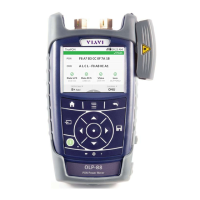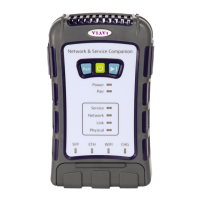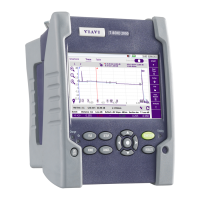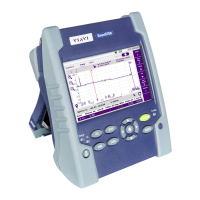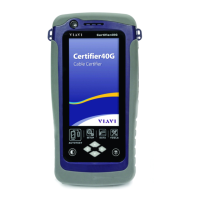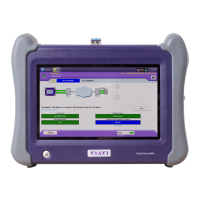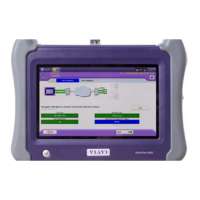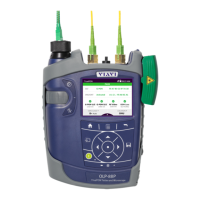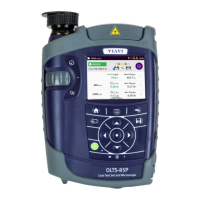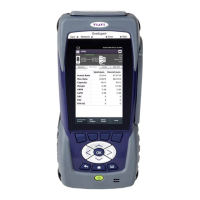Do you have a question about the Viavi AVX-10K and is the answer not in the manual?
Explains the manual's objective and scope for using the AVX-10K test set.
Lists terms used in the manual to refer to the AVX-10K Flight Line Test Set.
Defines the target audience for this operations manual.
Lists additional resources for product information and documentation.
Provides contact details for technical support and customer service.
Provides a general overview of the AVX-10K Flight Line Test Set and its applications.
Explains the AVX-10K's base platform, application module, and testing methods.
Details the hardware and system features of the AVX-10K, including design and connectivity.
Lists the avionics functions supported by the AVX-10K for testing.
Describes the software and firmware versions installed on the AVX-10K and update procedures.
Guides users through initial setup, unboxing, and running the self-test procedure.
Explains how to operate the AVX-10K locally via touchscreen or remotely via mobile app.
Details the physical components and layout of the AVX-10K, including side view and front view.
Describes methods for remotely controlling the AVX-10K using mobile or computer applications.
Explains the structure and components of the AVX-10K's user interface.
Details the various icons and indicators displayed in the AVX-10K's header for status.
Describes how to navigate through the AVX-10K's screens using controls and techniques.
Guides users on making selections and entering data in editable fields.
Explains how to create, remove, or overwrite application shortcuts on the Home Screen.
Details how to adjust various system settings like date, time, network, and software.
Guides on setting up wired Ethernet and wireless WiFi connections for the AVX-10K.
Provides procedures for updating AVX-10K software via StrataSync or USB.
Explains how to deploy software options to the AVX-10K using StrataSync.
Describes methods for setting up antennas, including direct connect with coupler and over-the-air.
Details settings common across multiple AVX-10K applications, like RF Port and Antenna Settings.
Allows selection of test methods: Antenna, Direct Connect, or Direct Connect with Coupler.
Configures antenna parameters such as range, height, and gain for over-the-air testing.
Enables setting cable length and entering estimated or exact cable loss.
Allows entry of the loss for the coupler being used in the test setup.
Sets the Unit Under Test Address to Auto or Manual for transponder tests.
Configures position data (LAT/LONG) for applications like ADS-B Auto.
Includes options for checking UUT capability and setting ADS-B Auto DF.
Accesses a list of previously saved tests to load or review data.
Covers saving reports and managing files using USB drives or StrataSync.
Details the setup and execution of automatic Transponder tests.
Explains the setup and operation of ADS-B Auto tests for airborne and surface modes.
Covers receiving, decoding, and displaying ADS-B transmissions.
Describes the GICB mode for decoding Enhanced Surveillance BDS register contents.
Guides on monitoring and decoding UAT Out information.
Covers setup and operation for TCAS testing, including scenarios and parameters.
Explains setup and operation for generating static intruders for ADS-B In Receiver testing.
Details setup and operation for UAT Traffic Generation, including FIS-B data.
Details the setup and operation of the ILS application, including various modes.
Covers setup and operation for the VOR application, including frequency and bearing settings.
Explains setup and operation for DME tests, including frequency and range parameters.
Details setup and operation for TACAN tests, including test modes and parameters.
Provides access to AM, FM, SSB, and SELCAL testing applications.
Details unique setup parameters for the COMM applications, including duty cycle limits.
Covers setup and receive/generate functions for VHF AM communication tests.
Details setup and receive/generate functions for VHF FM communication tests.
Explains setup and receive/generate functions for HF SSB communication tests.
Covers setup and generate functions for COMM SELCAL tests.
Provides monitoring for various emergency location transmitters like 406 MHz beacons.
Details unique setup parameters for the ELT application.
Guides on running tests for 406 MHz and 121.5/243 MHz beacons.
Explains the guided test function, allowing stored sequences of settings and steps.
Guides on creating new guided tests, including setting file names and execution modes.
Explains how to select and run previously saved guided tests step-by-step.
Details the process for deleting unwanted guided tests, requiring a password.
Guides on modifying existing guided tests, including changing steps and parameters.
Explains how to transfer guided tests between AVX-10K units using a USB drive.
Reviews the VSWR test function, scope, parameters, and calibration.
Details the DTF test function, scope, and equipment needed for cable analysis.
Describes the preloaded and user-defined cable types for VSWR and DTF tests.
Introduces system applications like StrataSync, network settings, and File Browser.
Lists system functions accessed from the device's Home Screen, including System Settings.
Provides step-by-step instructions for safely removing and replacing the AVX-10K battery.
Lists explanations for various tests and their performance criteria.
Provides common troubleshooting questions and answers for AVX-10K applications.
Lists and defines common abbreviations used in the AVX-10K manual.
Provides definitions for AVX-10K specific terms and aviation-related terminology.
Lists configuration limits for XPDR Auto tests for antenna and direct connect setups.
Details the standard accessories included with the AVX-10K and their part numbers.
Explains how to use antenna couplers for transponder diversity testing.
| Brand | Viavi |
|---|---|
| Model | AVX-10K |
| Category | Test Equipment |
| Language | English |
